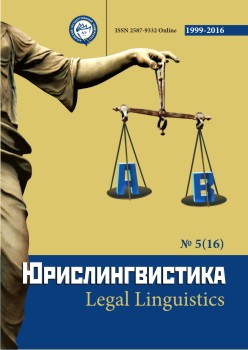PROTECTION FROM DEFAMATION UNDER THE US LAW
Abstract
The article supports the need for further reforming the institution of protection from defamation. The acuteness of protection from defamation is determined by a number of factors. Firstly, the Supreme Court of the Russian Federation in the judicial review for the first quarter of 2017 indicated that it is necessary to prove the tortuous composition in order to compensate for reputational damages. Secondly, the Russian institution of defamation law has such problems as: defamation laws fail when trying to give sufficient weight to the right to free speech; even if the content of these laws is satisfactory, the practice of their application fails to give due attention to the right to freedom of expression; government officials and other persons abuse these laws; the judicial system does not always follow the case law of the European Court of Human Rights concerning freedom of expression and information; the media are not always liable. The European Court noted in a number of cases that domestic courts generally did not establish boundaries between the right to free speech and business reputation. Protection from defamation is considered to be the most developed in America. Many provisions developed by the American jurisdiction have been accepted by the European Court of Justice. All of the aforesaid, as well as the significance of those constitutional rights in question, confirms the need for a thorough study of foreign experience amendments to existing norms and jurisprudence.
Downloads
Metrics
References
Решение Окружного суда штата Мэн от 31.03.1999 дело № 95-36-P-C // Справочно-правовая система [Электронный ресурс]. URL:http://law.justia.com/
Ким Джонатан Диффамация // Джонатан Ким / Сайт юридической школы Корнелл [Электронный ресурс]. URL:http://www.lawschool.cornell.edu/
Прессман Стивен Диффамация в Соединенных Штатах // [Электронный ресурс]. URL: usa.usembassy.de/etexts/media/unfetter/press08.htm
Рубинштейн Митчелл Х. Быстрый взгляд на Нью-Йоркское диффамационное право // Митчелл Х. Рубинштейн / Электронная библиотека [Электронный ресурс]. URL: https://www.researchgate.net/
Халм Джеймс Х. Вендикация репутации: альтернативы возмещению убытков // [Электронный ресурс]. URL: http://aulawreview.com/pdfs/30/30-2/Hulme.pdf
Защита репутации: Информационный бюллетень Европейского суда по правам человека // Сайт Европейского суда по правам человека [Электронный ресурс]. URL: http://www.echr.coe.int/Documents/FS_Reputation_ENG.pdf
REFERENCES:
The ruling of the District Court of Maine of 31.03.1999 case № 95-36-P-C // Reference legal system [Electronic resource] [Reshenie Okruzhnogo suda shtata Mjen ot 31.03.1999 delo № 95-36-P-C // Spravochno-pravovaja sistema [Jelektronnyj resurs].]. URL:http://law.justia.com/
Kim Jonathan Diffamation / Jonathan Kim // The site of the law school Cornell [Electronic resource] [Diffamacija // Dzhonatan Kim / Sajt juridicheskoj shkoly Kornell [Jelektronnyj resurs]]. URL: http: //www.lawschool.cornell.edu/
Pressman Stephen Diffamation in the United States // [Electronic resource] [Diffamacija v Soedinennyh Shtatah]. URL: usa.usembassy.de/etexts/media/unfetter/press08.htm
Rubenstein Mitchell H. A quick look at the New York defamation law // Mitchell H. Rubinstein / Electronic library [Electronic resource][ Bystryj vzgljad na N'ju-Jorkskoe diffamacionnoe pravo // Mitchell H. Rubinshtejn / Jelektronnaja biblioteka [Jelektronnyj resurs]. URL: https://www.researchgate.net/
Hulme James H. Vendication of reputation: alternatives to compensation of losses // [Electronic resource] [Vendikacija reputacii: al'ternativy vozmeshheniju ubytkov // [Jelektronnyj resurs]. URL: http://aulawreview.com/pdfs/30/30-2/Hulme.pdf
Protection of reputation: Factsheet of the European Court of Human Rights // The site of the European Court of Human Rights [Electronic resource][ Zashhita reputacii: Informacionnyj bjulleten' Evropejskogo suda po pravam cheloveka // Sajt Evropejskogo suda po pravam cheloveka [Jelektronnyj resurs].
Copyright (c) 2017 Юрислингвистика

This work is licensed under a Creative Commons Attribution 4.0 International License.
The authors, which are published in this journal, agree to the following conditions:
1. Authors retain the copyright to the work and transfer to the journal the right of the first publication along with the work, at the same time licensing it under the terms of the Creative Commons Attribution License, which allows others to distribute this work with the obligatory indication of the authorship of this work and a link to the original publication in this journal .
2. The authors retain the right to enter into separate, additional contractual agreements for the non-exclusive distribution of the version of the work published by this journal (for example, to place it in the university depository or to publish it in a book), with reference to the original publication in this journal.
3. Authors are allowed to post their work on the Internet (for example, in a university repository or on their personal website) before and during the review process of this journal, as this may lead to a productive discussion, as well as more links to this published work (See The Effect of Open Access).











